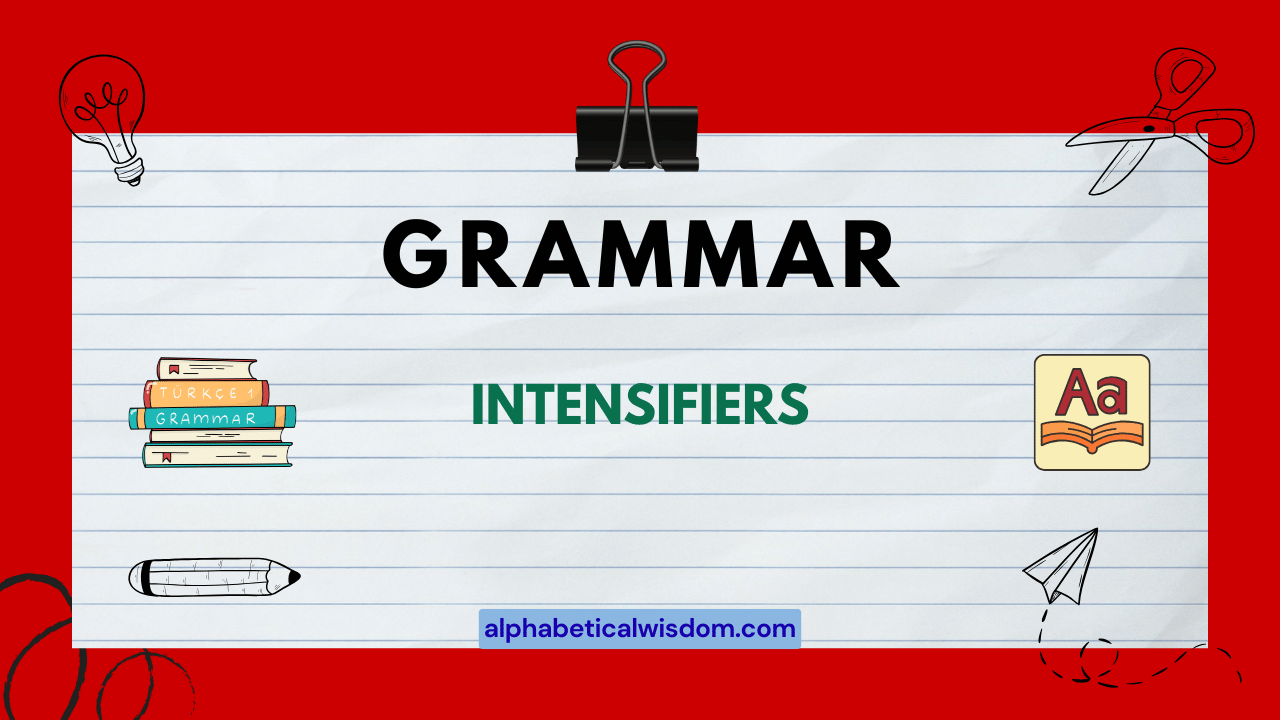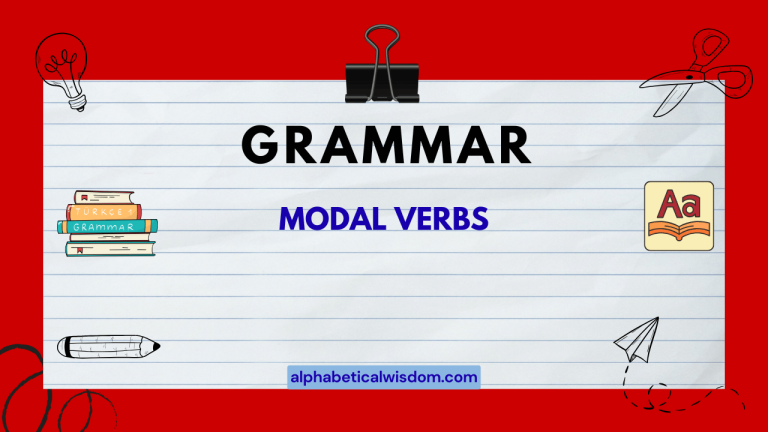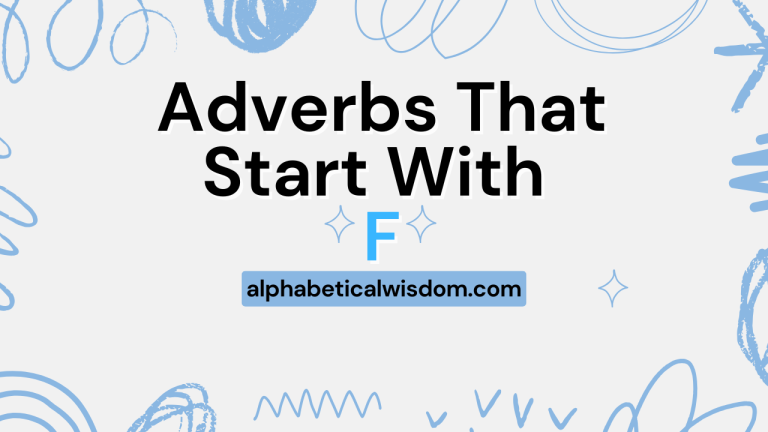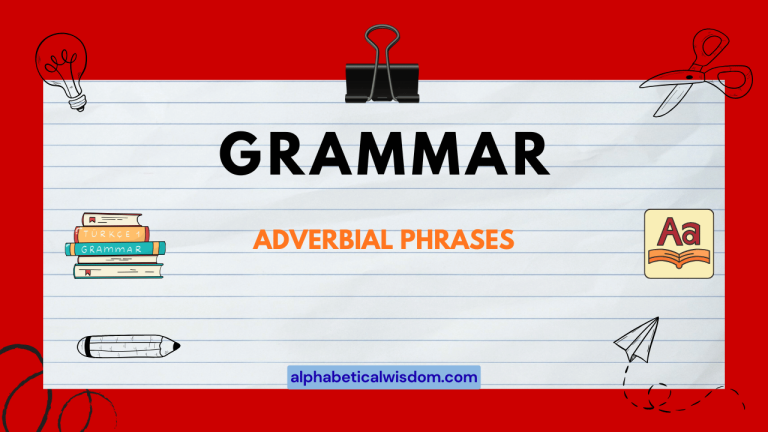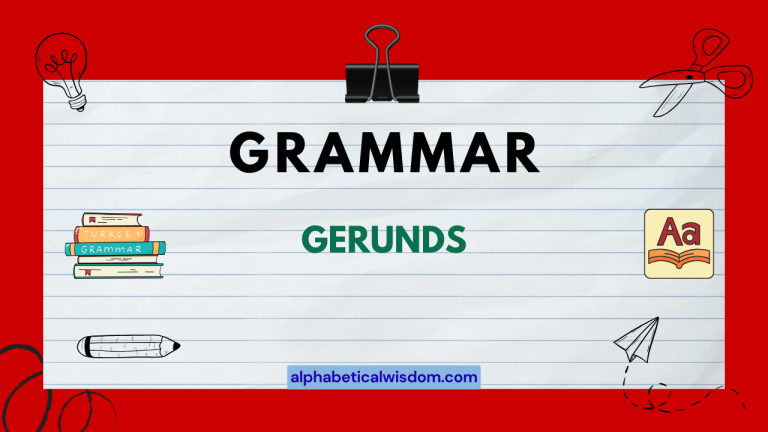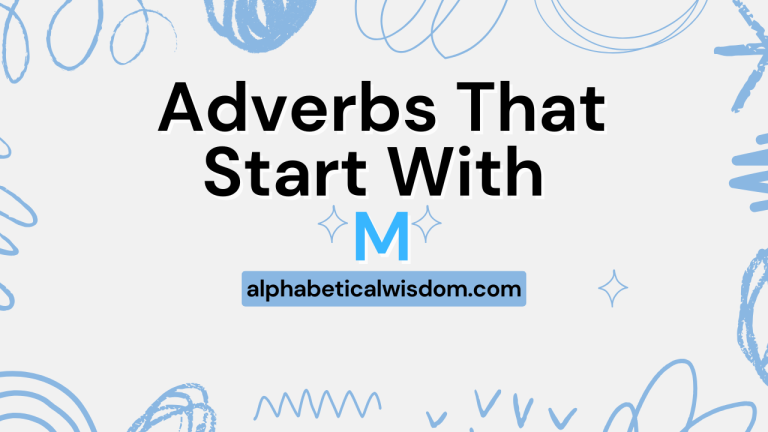Intensifiers: Mastering the Art of Emphasis in English
Intensifiers play a crucial role in English grammar, adding depth and emphasis to our language. Understanding how to use intensifiers correctly can significantly enhance your writing and speaking skills, making your communication more precise and impactful.
This article provides a comprehensive guide to intensifiers, exploring their definition, structure, types, usage rules, common mistakes, and advanced applications. Whether you’re a beginner or an advanced learner, this guide will equip you with the knowledge and skills to master the art of emphasis in English.
This article will benefit English language learners of all levels, from those just starting to grasp the basics to advanced speakers aiming to refine their nuance and precision. Native English speakers seeking a refresher on proper usage will also find value in the comprehensive explanations and examples provided.
Table of Contents
- Definition of Intensifiers
- Structural Breakdown
- Types and Categories of Intensifiers
- Examples of Intensifiers
- Usage Rules for Intensifiers
- Common Mistakes with Intensifiers
- Practice Exercises
- Advanced Topics
- Frequently Asked Questions (FAQ)
- Conclusion
Definition of Intensifiers
An intensifier is a word, typically an adverb or adjective, that strengthens or weakens the meaning of another word, phrase, or clause. Intensifiers add emphasis or degree to the word they modify. They do not add factual information but rather alter the impact of the statement. Intensifiers are used to express the speaker’s or writer’s attitude or emotion toward the subject they are describing. Understanding intensifiers is crucial for effective communication as they allow for precise expression of feelings and attitudes, adding color and depth to language.
Intensifiers can be classified based on their function and the type of word they modify. Some intensifiers, like very or extremely, increase the intensity, while others, such as slightly or somewhat, decrease it. The choice of intensifier depends on the desired effect and the context of the communication. The function of intensifiers is primarily to modify adjectives and adverbs, but they can also occasionally modify verbs to a lesser extent, influencing the strength of the action being described.
The context in which intensifiers are used significantly impacts their meaning and effectiveness. A word like “incredibly” might be appropriate in informal conversation but could be too colloquial for formal writing.
Similarly, an intensifier such as “rather” might be suitable in British English but may sound unusual in American English. Therefore, it’s essential to consider the audience and purpose of communication when selecting an intensifier.
Structural Breakdown
The structural breakdown of intensifiers involves understanding their position in a sentence and how they relate to the words they modify. Typically, intensifiers precede the adjectives or adverbs they modify.
However, some intensifiers can also be placed after the word they intensify, especially in informal speech. The position of the intensifier can sometimes affect the emphasis of the sentence.
For instance, placing the intensifier at the beginning of a sentence can draw more attention to the modified word.
The basic structure involving intensifiers is as follows: Intensifier + Modified Word. For example, in the phrase “very happy,” “very” is the intensifier, and “happy” is the adjective being modified. Similarly, in the sentence “He ran quite quickly,” “quite” is the intensifier modifying the adverb “quickly.” The intensifier adds a degree of strength to the adjective or adverb, amplifying or diminishing its meaning.
Some intensifiers can also be used in conjunction with other modifiers. For instance, in the phrase “extremely well-behaved,” “extremely” intensifies the compound adjective “well-behaved.” In such cases, the intensifier usually precedes all the modifiers to maximize its impact.
Understanding these structural patterns helps in constructing grammatically correct and effective sentences with intensifiers.
Types and Categories of Intensifiers
Intensifiers can be categorized based on their function and the type of word they modify. The three main categories are adverbial intensifiers, degree intensifiers, and those that specifically intensify adjectives.
Each category has its own set of words and usage patterns.
Adverbial Intensifiers
Adverbial intensifiers modify adverbs, providing additional information about the manner, time, place, or degree of the action. These intensifiers enhance the adverb’s meaning, making the description more vivid and precise. Examples of adverbial intensifiers include “incredibly,” “exceptionally,” and “remarkably.”
Adverbial intensifiers often express a high degree of intensity. For example, “She sang incredibly well” indicates that her singing was not just good but outstanding.
The choice of adverbial intensifier can significantly impact the tone and emphasis of the sentence. The correct usage of these intensifiers can elevate the quality of writing and speech.
Here is a table that shows examples of the use of adverbial intensifiers:
| Sentence | Adverbial Intensifier | Modified Adverb |
|---|---|---|
| He finished the race remarkably quickly. | remarkably | quickly |
| She danced exceptionally gracefully. | exceptionally | gracefully |
| The team played incredibly skillfully. | incredibly | skillfully |
| The students learned surprisingly fast. | surprisingly | fast |
| The machine operates unusually smoothly. | unusually | smoothly |
| The project progressed exceptionally rapidly. | exceptionally | rapidly |
| The speaker delivered the speech remarkably eloquently. | remarkably | eloquently |
| The chef cooked the meal incredibly deliciously. | incredibly | deliciously |
| The athlete performed exceptionally athletically. | exceptionally | athletically |
| The artist painted remarkably beautifully. | remarkably | beautifully |
| The comedian told the story incredibly hilariously. | incredibly | hilariously |
| The conductor directed the orchestra exceptionally masterfully. | exceptionally | masterfully |
| The negotiator handled the situation remarkably tactfully. | remarkably | tactfully |
| The detective investigated the case incredibly thoroughly. | incredibly | thoroughly |
| The teacher explained the concept exceptionally clearly. | exceptionally | clearly |
| The gardener tended to the flowers remarkably carefully. | remarkably | carefully |
| The writer crafted the novel incredibly skillfully. | incredibly | skillfully |
| The programmer coded the software exceptionally efficiently. | exceptionally | efficiently |
| The musician played the instrument remarkably passionately. | remarkably | passionately |
| The scientist conducted the experiment incredibly meticulously. | incredibly | meticulously |
| The manager led the team exceptionally effectively. | exceptionally | effectively |
| The lawyer argued the case remarkably persuasively. | remarkably | persuasively |
| The doctor treated the patient incredibly compassionately. | incredibly | compassionately |
| The engineer designed the bridge exceptionally innovatively. | exceptionally | innovatively |
| The entrepreneur launched the business remarkably successfully. | remarkably | successfully |
Degree Intensifiers
Degree intensifiers indicate the extent or degree to which something is true. These intensifiers modify adjectives, adverbs, or verbs to show the intensity of the quality or action. Common degree intensifiers include “very,” “quite,” “extremely,” “slightly,” and “somewhat.”
Degree intensifiers can either strengthen or weaken the meaning of the word they modify. For instance, “very happy” strengthens the feeling of happiness, while “slightly disappointed” weakens the feeling of disappointment.
The choice of degree intensifier depends on the intended level of emphasis and the context of the sentence.
The following table demonstrates various degree intensifiers in use:
| Sentence | Degree Intensifier | Modified Word |
|---|---|---|
| She is very talented. | very | talented |
| He is quite intelligent. | quite | intelligent |
| The movie was extremely exciting. | extremely | exciting |
| I am slightly concerned. | slightly | concerned |
| The weather is somewhat pleasant. | somewhat | pleasant |
| The food was really delicious. | really | delicious |
| The book was incredibly captivating. | incredibly | captivating |
| The task was fairly easy. | fairly | easy |
| The situation is pretty complicated. | pretty | complicated |
| The performance was remarkably impressive. | remarkably | impressive |
| The solution was surprisingly simple. | surprisingly | simple |
| The journey was utterly exhausting. | utterly | exhausting |
| The experience was exceptionally rewarding. | exceptionally | rewarding |
| The design was particularly innovative. | particularly | innovative |
| The event was significantly successful. | significantly | successful |
| The lecture was immensely informative. | immensely | informative |
| The landscape was breathtakingly beautiful. | breathtakingly | beautiful |
| The result was overwhelmingly positive. | overwhelmingly | positive |
| The feedback was generally favorable. | generally | favorable |
| The project was substantially complete. | substantially | complete |
| The problem was hardly noticeable. | hardly | noticeable |
| The movie was thoroughly enjoyable. | thoroughly | enjoyable |
| The presentation was widely appreciated. | widely | appreciated |
| The concert was absolutely amazing. | absolutely | amazing |
| The hike was intensely challenging. | intensely | challenging |
| The meeting was partially productive. | partially | productive |
Intensifying Adjectives
Some adjectives inherently act as intensifiers by emphasizing the quality they describe. These adjectives often convey a sense of extreme or absolute quality.
Examples include “absolute,” “complete,” “total,” and “utter.”
Intensifying adjectives are often used to express strong feelings or opinions. For instance, “absolute disaster” conveys a stronger sense of failure than simply saying “disaster.” These adjectives add force and conviction to the statement, making it more impactful.
Understanding how to use these adjectives effectively can enhance the expressive power of language.
Here are some examples that demonstrate the use of intensifying adjectives:
| Sentence | Intensifying Adjective | Modified Noun |
|---|---|---|
| It was an absolute pleasure meeting you. | absolute | pleasure |
| The project was a complete success. | complete | success |
| The situation was a total mess. | total | mess |
| The experience was an utter failure. | utter | failure |
| The decision was a pure coincidence. | pure | coincidence |
| The movie was a sheer delight. | sheer | delight |
| The event was a perfect example. | perfect | example |
| The result was a clear victory. | clear | victory |
| The performance was a stunning achievement. | stunning | achievement |
| The mistake was a grave error. | grave | error |
| The response was a unanimous agreement. | unanimous | agreement |
| The feeling was a sincere apology. | sincere | apology |
| The gesture was a genuine act. | genuine | act |
| The view was a breathtaking sight. | breathtaking | sight |
| The news was a shocking revelation. | shocking | revelation |
| The opportunity was a golden chance. | golden | chance |
| The taste was a delightful surprise. | delightful | surprise |
| The sound was a deafening roar. | deafening | roar |
| The smell was a pungent odor. | pungent | odor |
| The touch was a gentle caress. | gentle | caress |
| The proposal was a bold suggestion. | bold | suggestion |
| The statement was a blunt admission. | blunt | admission |
| The solution was a creative idea. | creative | idea |
| The approach was a novel method. | novel | method |
| The strategy was a clever plan. | clever | plan |
Examples of Intensifiers
Intensifiers are versatile and can be used in various contexts to add emphasis and nuance to language. Understanding how to use intensifiers effectively requires familiarity with their different types and usage patterns.
Adverbial Intensifier Examples
Adverbial intensifiers modify adverbs, adding a layer of intensity to the description of an action or manner. These intensifiers enhance the impact of the adverb, making the description more vivid and memorable.
For example, instead of saying “He ran fast,” you could say “He ran incredibly fast,” which adds a stronger sense of speed and urgency. Similarly, “She spoke eloquently” can be intensified to “She spoke remarkably eloquently,” emphasizing the speaker’s skill and grace.
Degree Intensifier Examples
Degree intensifiers modify adjectives, adverbs, or verbs to indicate the extent or degree to which something is true. These intensifiers allow for precise expression of the intensity of a quality or action.
Using degree intensifiers, you can transform “The food was good” into “The food was very good,” indicating a higher level of satisfaction. Conversely, “I was disappointed” can become “I was slightly disappointed,” softening the expression of disappointment.
The choice of degree intensifier allows for nuanced communication.
Adjective Intensifier Examples
Some adjectives function as intensifiers by inherently emphasizing the quality they describe. These adjectives often convey a sense of extreme or absolute quality, adding force and conviction to the statement.
For instance, “disaster” can be intensified to “absolute disaster,” conveying a stronger sense of failure and devastation. Similarly, “success” can become “complete success,” emphasizing the thoroughness and completeness of the achievement.
These intensifying adjectives add significant impact to the message.
Usage Rules for Intensifiers
Proper usage of intensifiers is essential for clear and effective communication. Understanding the rules governing their use can help avoid common mistakes and enhance the precision of language.
Adjective Agreement
Intensifiers must agree with the adjectives they modify. This means that the intensifier should be appropriate for the type of adjective being used.
For example, it is more common to say “very interesting” than “utterly interesting,” as “utter” is typically used with more extreme adjectives.
The choice of intensifier should also reflect the intended level of emphasis. Using an intensifier that is too strong or too weak can distort the meaning of the sentence.
Therefore, it’s important to select an intensifier that accurately conveys the desired level of intensity.
Adverb Placement
The placement of intensifiers in a sentence can affect the emphasis and meaning. Typically, intensifiers are placed directly before the adjective or adverb they modify.
However, in some cases, the intensifier can be placed at the beginning of the sentence to draw more attention to the modified word.
For example, “She is very beautiful” places the emphasis on the degree of beauty, while “Very beautiful she is” places greater emphasis on the beauty itself. The choice of placement depends on the intended focus of the sentence.
Formal vs. Informal Usage
The choice of intensifier should also be appropriate for the context of the communication. Some intensifiers are more suitable for formal writing and speech, while others are better suited for informal conversation.
For example, “extremely” and “remarkably” are often used in formal contexts, while “really” and “pretty” are more common in informal settings. Using an intensifier that is inappropriate for the context can make the communication sound awkward or unnatural.
It’s important to consider the audience and purpose of communication when selecting an intensifier.
Common Mistakes with Intensifiers
Several common mistakes can occur when using intensifiers. These mistakes can affect the clarity and effectiveness of communication.
Understanding these errors and how to avoid them is crucial for mastering the use of intensifiers.
One common mistake is using intensifiers that do not match the adjective or adverb they modify. For example, saying “utterly happy” sounds awkward because “utterly” is typically used with negative adjectives.
Another mistake is overusing intensifiers, which can make the writing or speech sound exaggerated and insincere. It’s important to use intensifiers sparingly and only when they add genuine emphasis.
Another frequent error is misplacing intensifiers in a sentence. Placing the intensifier in the wrong position can change the meaning of the sentence or make it sound unnatural.
It’s important to ensure that the intensifier is placed directly before the word it modifies, unless there is a specific reason to place it elsewhere. Finally, using intensifiers that are inappropriate for the context can also be a mistake.
Choosing an intensifier that is too formal or too informal for the situation can make the communication sound awkward or out of place.
Here’s a table illustrating common mistakes with intensifiers:
| Incorrect | Correct | Explanation |
|---|---|---|
| She is utterly happy. | She is very happy. | “Utterly” is usually used with negative adjectives. |
| He ran quite excellently. | He ran very well. | “Excellently” is redundant with “quite.” |
| The food was absolutely okay. | The food was okay. | “Absolutely” is typically used with stronger positives or negatives. |
| I am fairly furious. | I am quite furious. | “Quite” is a better fit with “furious” to show intensity. |
| It was a bit amazing. | It was quite amazing. | “Bit” downplays instead of intensifying. |
| She is totally sad. | She is very sad. | “Totally” is overly informal. |
| The movie was completely boring. | The movie was very boring. | “Completely” is redundant with “boring.” |
| He is incredibly average. | He is fairly average. | “Incredibly” exaggerates “average.” |
| She sang awfully beautifully. | She sang beautifully. | “Awfully” is generally negative. |
| The dress was utterly pretty. | The dress was very pretty. | “Utterly” implies more extreme emotion. |
Practice Exercises
Practicing the use of intensifiers is crucial for mastering their application in English. The following exercises will help reinforce your understanding of intensifiers and improve your ability to use them correctly.
Exercise 1: Identifying Intensifiers
Identify the intensifier in each of the following sentences. Write your answers in the space provided.
- She is very talented.
- He ran incredibly fast.
- The movie was extremely exciting.
- I am slightly concerned.
- The weather is somewhat pleasant.
- The book was really captivating.
- The task was fairly easy.
- The situation is pretty complicated.
- The performance was remarkably impressive.
- The solution was surprisingly simple.
Answers:
- very
- incredibly
- extremely
- slightly
- somewhat
- really
- fairly
- pretty
- remarkably
- surprisingly
Exercise 2: Using Intensifiers Correctly
Fill in the blank with the appropriate intensifier from the list provided: very, quite, extremely, slightly, somewhat.
- The coffee is ______ hot.
- I am ______ tired today.
- The test was ______ difficult.
- She is ______ happy with her results.
- The room is ______ messy.
- The music is ______ loud.
- The weather is ______ cold.
- He is ______ nervous about the presentation.
- The food is ______ delicious.
- The movie is ______ interesting.
Answers:
- very
- somewhat
- extremely
- quite
- slightly
- extremely
- very
- quite
- extremely
- very
Exercise 3: Rewriting Sentences with Intensifiers
Rewrite the following sentences using an intensifier to add emphasis.
- She is talented.
- He ran fast.
- The movie was exciting.
- I am concerned.
- The weather is pleasant.
- The book was captivating.
- The task was easy.
- The situation is complicated.
- The performance was impressive.
- The solution was simple.
Answers:
- She is very talented.
- He ran incredibly fast.
- The movie was extremely exciting.
- I am slightly concerned.
- The weather is somewhat pleasant.
- The book was really captivating.
- The task was fairly easy.
- The situation is pretty complicated.
- The performance was remarkably impressive.
- The solution was surprisingly simple.
Advanced Topics
For advanced learners, understanding the nuances of intensifiers in idioms and figurative language can further enhance their language skills. This section explores these advanced topics.
Intensifiers in Idioms
Intensifiers are often used in idioms to add emphasis and color to the expression. Idioms are fixed expressions with meanings that cannot be deduced from the literal definitions of the individual words.
Intensifiers in idioms enhance the emotional impact and vividness of the expression.
For example, the idiom “dead tired” uses the intensifier “dead” to emphasize the extreme level of fatigue. Similarly, “stone cold” uses “stone” to intensify the coldness, implying a complete lack of warmth or emotion.
Understanding how intensifiers function in idioms can help learners grasp the full meaning and context of these expressions.
Intensifiers in Figurative Language
Intensifiers are also commonly used in figurative language, such as metaphors, similes, and hyperboles, to create vivid and impactful imagery. Figurative language uses words or expressions with a meaning that is different from the literal interpretation.
In metaphors, intensifiers can strengthen the comparison, as in “He is a total rock,” where “total” emphasizes the steadfastness and reliability of the person. In similes, intensifiers can highlight the degree of similarity, as in “She is as bright as a button,” where “as” intensifies the comparison.
In hyperboles, intensifiers exaggerate the statement for emphasis, as in “I’m so hungry I could eat a horse,” where “so” intensifies the feeling of hunger.
Frequently Asked Questions (FAQ)
- What is the difference between an intensifier and an adverb?
An adverb modifies a verb, adjective, or another adverb, providing information about how, when, where, or to what extent something is done. An intensifier, on the other hand, is a type of adverb that specifically strengthens or weakens the meaning of another word or phrase. All intensifiers are adverbs, but not all adverbs are intensifiers.
- Can intensifiers be used with nouns?
While intensifiers primarily modify adjectives and adverbs, some adjectives can function as intensifiers when modifying nouns. For example, in the phrase “absolute disaster,” the adjective “absolute” acts as an intensifier, emphasizing the severity of the disaster.
- How do I choose the right intensifier for a sentence?
Choosing the right intensifier depends on the intended level of emphasis and the context of the communication. Consider the type of word you are modifying, the desired tone, and the audience. Formal contexts may require more formal intensifiers, while informal settings allow for more casual choices.
- Is it possible to overuse intensifiers?
Yes, overusing intensifiers can make writing or speech sound exaggerated and insincere. It’s important to use intensifiers sparingly and only when they add genuine emphasis to the message. Too many intensifiers can dilute the impact and make the communication less effective.
- Are there any intensifiers that should be avoided in formal writing?
Yes, some intensifiers are more suitable for informal conversation and should be avoided in formal writing. Examples include “pretty,” “really,” and “sort of.” In formal contexts, it’s better to use intensifiers such as “extremely,” “remarkably,” and “significantly.”
- How does the placement of an intensifier affect the meaning of a sentence?
The placement of an intensifier can affect the emphasis of the sentence. Typically, intensifiers are placed directly before the word they modify. However, placing the intensifier at the beginning of the sentence can draw more attention to the modified word, shifting the focus of the sentence.
- Can intensifiers change the meaning of an adjective or adverb?
Yes, intensifiers can change the intensity or degree of an adjective or adverb. They do not change the fundamental meaning but rather alter the strength or impact of the word. For example, “happy” and “very happy” both convey a positive emotion, but “very happy” expresses a stronger degree of happiness.
- What are some common intensifiers used in everyday conversation?
Some common intensifiers used in everyday conversation include “very,” “really,” “pretty,” “quite,” and “slightly.” These intensifiers are versatile and can be used in a variety of contexts to add emphasis and nuance to spoken language.
- Are there regional differences in the use of intensifiers?
Yes, there can be regional differences in the use of intensifiers. For example, “rather” is more commonly used as an intensifier in British English than in American English. Similarly, some intensifiers may have different connotations or levels of formality in different regions.
- How can I improve my usage of intensifiers?
To improve your usage of intensifiers, practice identifying and using them in various contexts. Pay attention to the type of word you are modifying, the desired tone, and the audience. Read widely and listen to native speakers to observe how they use intensifiers in different situations. Additionally, seek feedback from teachers or language partners to identify areas for improvement.
Conclusion
Mastering intensifiers is essential for effective communication in English. Intensifiers add depth and emphasis to language, allowing for precise expression of feelings and attitudes.
Understanding their definition, structure, types, usage rules, and common mistakes can significantly enhance writing and speaking skills.
Key takeaways from this guide include the importance of choosing the right intensifier for the context, avoiding overuse, and understanding the nuances of intensifiers in idioms and figurative language. Practice identifying and using intensifiers in various contexts and seek feedback to improve your skills.
By mastering intensifiers, you can add color, force, and conviction to your language, making your communication more impactful and memorable.
Remember to consider the audience, purpose, and tone of your communication when selecting intensifiers. With practice and attention to detail, you can master the art of emphasis in English and communicate with greater precision and impact.
